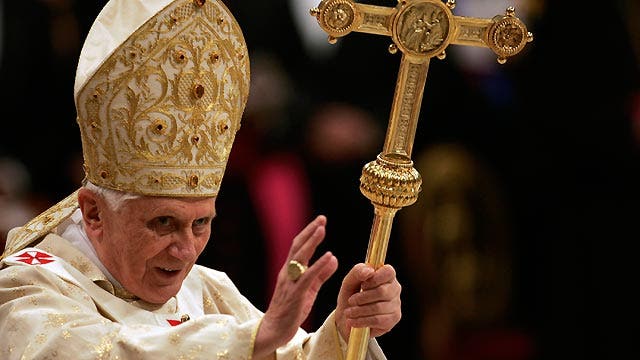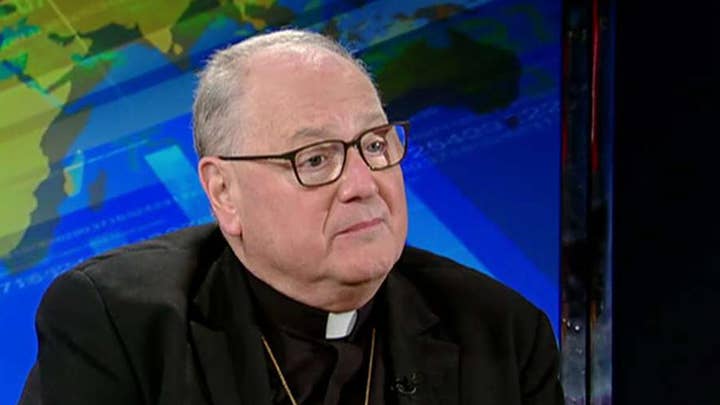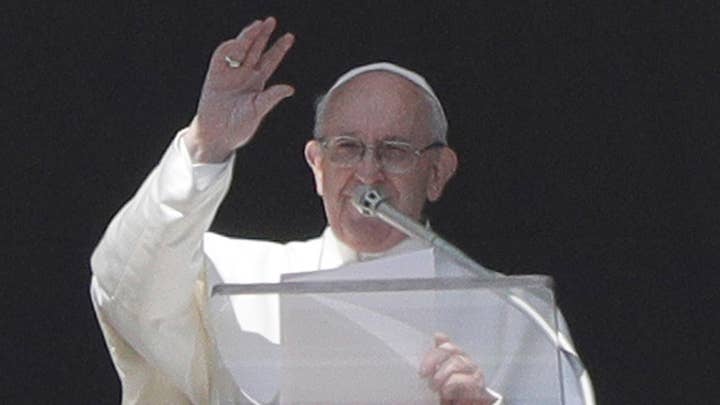Absence of God, the sexual revolution of the swinging ‘60s and the formation of “homosexual cliques” in seminaries are to blame for the Catholic Church’s rampant sex abuse scandals, retired Pope Benedict XVI has said.
In 6,000-word essay – published Thursday in the German monthly Klerusblatt, the Catholic News Agency and in other conservative media – the former pontiff tranced the start of the clergy abuse to when sex began to appear in films in his native Bavaria.
He also blamed the crisis on failures of moral theology in that era and slammed church laws in place that gave protection to priests accused of abuse.
RETIRED POPE BENEDICT SAYS HE IS IN LAST PHASE OF LIFE, ON 'PILGRIMAGE HOME'
“Why did pedophilia reach such proportions? Ultimate, the reason is the absence of God,” Benedict wrote. “Perhaps it is worth mentioning that in not a few seminaries, students caught reading my books were considered unsuitable for the priesthood. My books were hidden away, like bad literature, and only read under the desk.”
The conservative theologian said that during the 1980s and 1990s, “the right to a defense [for priests] was so broad as to make a conviction nearly impossible.”
As Cardinal Joseph Ratzinger, Benedict spearheaded reforms of those laws in 2001 to make it easier to remove priests who abused children. Benedict took a hard line against clerical sex abuse as the Vatican's conservative doctrine chief, and later as pope, defrocking hundreds of priests accused of raping and molesting children.
POPE FRANCIS KISSES SHOES OF SUDANESE LEADERS IN PLEA FOR PEACE
Benedict’s essay was immediately criticized as “catastrophically irresponsible” because it conflicts with efforts by his successor, Pope Francis, to lead the church out of the sex abuse crisis.
Benedict, who retired in 2013 and turns 92 next week, also blamed the scandal on a clerical culture in the church that raises priests above worshippers.
The essay was criticized by church historians including Christopher Bellitto, who questioned if Benedict was being manipulated by others. He said the essay omitted the critical conclusions that arose from the pope's February sex abuse summit in Rome, including that "abusers were priests along the ideological spectrum, that the abuse predated the 1960s, that it is a global and not simply Western problem, that homosexuality is not the issue in pedophilia."
"It is catastrophically irresponsible, because it creates a counter-narrative to how Francis is trying to move ahead based on the 2019 summit," Bellitto told The Associated Press in an email. "The essay essentially ignores what we learned there."
POPE VOWS TO CONFRONT CLERGY SEX ABUSERS, PREDATORS WITH 'WRATH OF GOD'
Villanova University theologian Massimo Faggioli called the essay a thin analysis that omitted key cases that began well before the 1960s.
“If a pope emeritus decides to stay silent, it's one thing and can be defended. But speaking and telling a tiny part and a very personal version of the story, it's hard to defend,” he said on Twitter. “Everything we know in the global history of the Catholic abuse crisis makes Benedict XVI's take published yesterday very thin or worse: a caricature of what happened during in the Catholic Church during the post-Vatican II period -- with all its ingenuities and some tragic mistakes."
Meanwhile, the essay was applauded by some on the right. Writing in The Catholic Herald, Chat Pecknold praised the intervention as a necessary word from "the voice of a father" that accurately identified an absence of God as the reason for the crisis.
CLICK HERE TO GET THE FOX NEWS APP
"I suspect that after all the studies are done after the review boards are formed, cases heard, after new protocols and safeguards are in place, Benedict's answer will be the one which endures," he wrote. "What will be remembered as the seed of renewal, as the root of restoration, is precisely Benedict's counsel that we turn our faces back to Christ who is the perfect image of the Father's love."
The Associated Press contributed to this report.




